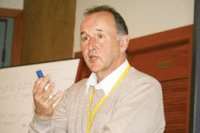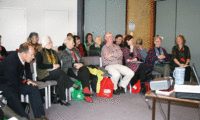Palmerston North
Mary Betz
3 October 2011
In the Let Us Pray symposium in Palmerston North in mid-August, Mgr Gerard Burns looked at how to pray in a world of injustice. He began the workshop on prayer and justice by posing several questions. In this article, workshop participant Mary Betz dialogues with him in response.
 What is our experience of justice/injustice, poverty/wealth, oppression/non-oppression?
What is our experience of justice/injustice, poverty/wealth, oppression/non-oppression?
God gives us resources for prayer within our own experience. Gustavo Gutierrez wrote a book called We Drink from our own Wells, a phrase that came originally from Bernard of Clairvaux. It means that we must think, pray and work in the place from which our own spiritual nourishment comes.
For Gutierrez, that place was in the struggle of poor Peruvians to live, and that experience, he says, is the well that ‘provides living water that both purifies and energises’.
Know that sometimes we are a part of the injustice, and that experiencing deep injustice changes us forever – the way we act and the way we pray.
Where are the wells in my life through which God provides me spiritual nourishment?
 What is our prayer response to injustice?
What is our prayer response to injustice?
We see in our churches and homes the person of Jesus nailed to a cross, condemned unjustly to an unjust death. We see around the world and in our own country, injustices that cause tremendous suffering and death. What is an adequate prayer?
Such prayer must be one to change ourselves: to purify ourselves from the things that hold us back from acting or from anger. Our prayer must be that of listening to God – the voice within, the voices of the poor, the song of birds… Sometimes wordless prayer is the only response to war, abuse, starvation, torture, trafficking and other hideous injustices.
What kind of prayer do we pray for injustice?
Sometimes it is a prayer of not knowing the answers, a prayer of anguish and lament. Sometimes it is a prayer of action, of protest, of support. Often it must be a non-utilitarian prayer.
Asking may be wasting our time – God is already in the people, in the situation, God already knows far more than we ever will. But it is still important to pray, to step out of the situation we are so enmeshed in and take time to listen more carefully for God’s voice.
Are there seasons of prayer in the lives of those who work for justice and peace?
There are dark nights, bitter nights, aloneness, a stripping down.
What sort of a God are we praying to, is praying in us, is sending us on mission?
Sometimes we don’t know anymore. Thomas Merton says that often we have to strip away layers of preconceived notions of who God is.
It is not comfortable and can be quite painful because we are stepping out of comfortable beliefs about God. We are ‘plunging into the reality of God through our own experiences…relying solely on the Spirit to guide us’.
The God revealed to us may be different from the one we have prayed to for many years. But whoever God is, our God is one who looks and listens and hears the cry of the poor – through us.
Almost 40 people attended the workshop on Friday morning, August 12, making it one of the most popular in the symposium.
At the start, Mgr Burns invited participants to say how they had come to an understanding about social justice in the gospels.
Many had been challenged and stimulated by the 1981 Springbok Tour, others had seen injustice at work and wanted to know how to address this in a gospel, prayer-centred way. A number of teachers said they wanted to know how to teach about social justice in their schools.
Organisations like the Justice and Peace Commission, Pax Christi and Greenham Common had been justice springboards for some and one participant spoke of working for a time in Australia’s Northern Territory and learning of the ‘lost generation’ of children taken from their Aboriginal parents over more than 50 years.
Mary Betz works in the Pastoral Office and with the Justice and Peace Commission in Auckland Diocese.